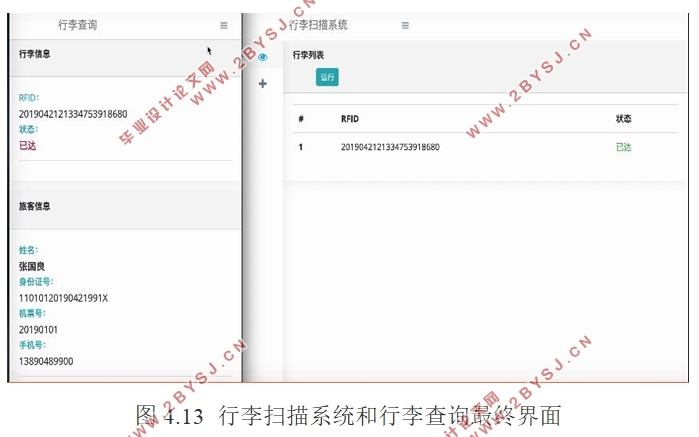基于RFID的机场行李快速匹配系统的设计(Java,MySQL)
无需注册登录,支付后按照提示操作即可获取该资料.
基于RFID的机场行李快速匹配系统的设计(JAVA,MySQL)(论文11400字,程序代码,MySQL数据库)
摘要:机场设备的智能化体现了我国在航空领域的水平。现代技术的快速发展也为机场行李匹配的升级奠定了基础。如今,在各大机场大多以条码方式分拣行李,这已经为行李匹配提供了方便,但是由于取行李终端需要人眼识别,经常会造成时间过长,甚至取错行李。本文介绍了一种机场行李匹配系统,利用RFID技术,每件行李上贴上电子标签,标签中包含个人信息,航班号等等,与行李主人嵌入在机票内的读写器形成频率匹配并发出提示信息,从而缩短等待行李时间,降低出错概率。采用JAVA编程语言,以PC端为载体实现系统。通过系统调试,提出需要完善之处,为下一步工作奠定基础。
关键字:行李检测;行李匹配;电子标签;RFID系统;超高频读写器
RFID-based Airport Baggage Rapid Matching System
Abstract: The intelligence of airport equipment reflects China's level in the aviation field. The rapid development of modern technology has also laid the foundation for the upgrade of airport baggage matching. Nowadays, most of the airports are sorting baggage by bar code, which has already facilitated baggage matching. However, since the baggage terminal needs human eye recognition, it often causes too long time and even takes the wrong baggage. This paper introduces an airport baggage matching system, which uses RFID technology to attach an electronic tag to each piece of baggage. The tag contains personal information, flight number, etc., and the frequency of the reader membedded in the ticket is matched and issued. Prompt information, thus reducing waiting time and reducing the probability of error. The JAVA programming language is used to implement the system with the PC as the carrier. Through system debugging, it is necessary to improve the situation and lay the foundation for the next step.
Key words: Baggage detection; Baggage matching; Electronic Tag; RFID system; UHF reader




目 录
1 绪论 1
1.1 研究背景 1
1.2 研究意义 1
1.3 国内外研究现状 1
1.3.1 RFID技术研究现状 1
1.3.2 机场行李分拣匹配发展现状 2
1.4 研究内容 2
1.5 论文的组织结构 2
2 基本理论与方法 3
2.1 RFID概述 3
2.2 RFID基本组成 3
2.2.1 阅读器(读写器) 4
2.2.2 电子标签 4
2.2.3 天线 5
2.2.4 中间件 5
2.3 RFID频率特性 5
2.4 RFID工作原理 6
2.5基于射频识别技术的定位方法 6
2.5.1 LANDMARC定位方法 6
2.5.2 VIRE定位方法 7
2.6 RFID的数据传输 7
3 需求分析 8
3.1可行性分析 8
3.1.1经济可行性 8
3.1.2技术可行性 8
3.1.3社会可行性 8
3.2 系统需求分析 8
3.2.1 RSSI定位算法 8
3.2.2 MySOL数据库 9
3.2.3 RFID标签防碰撞问题 9
4 系统设计与实现 10
4.1系统的总体设计 10
4.2 数据库设计 11
4.3 RFID标签处理过程 12
4.4 标签信息传输系统 14
4.5 系统实现 15
4.5.1前端实现 15
4.5.2后端实现 16
4.5.3模拟RFID实现模块 18
5 总结与展望 19
参考文献 20
致谢 21
